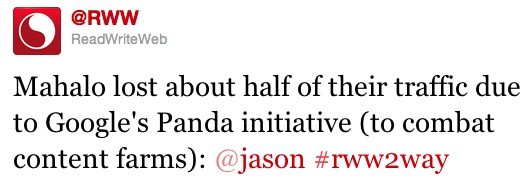How the Human-Curated Web is Winning, Even if Mahalo Isn’t
As social replaces search, humans show their superior ability to defeat the web’s spammers and disinformation
Mahalo, the Wikipedia-esque human-curated directory of information on various topics, had its traffic cut in half by recent efforts by Google to eliminate spam from its search listings. It seems like the ultimate victory of Google’s algorithm over the attempts to revive the original way to organize the Web, that is, hire a bunch of humans to do it for you. For example, before the Web was so vast it took data centers’ worth of servers to parse it, this is how Yahoo got its start.
But the humans are winning this battle, and Google knows it. Mark Zuckerberg, for all his flaws, is our John Connor in this war with the machines.
It’s rare for a technology to simply go away, and algorithmic search won’t, ever. But spammers and profiteers mean the Internet has become one giant Turing test for search ranking algorithms, and those algorithms are losing, leading to an overall decline in the quality of search as a tool for filtering out signal from noise on the Web.
This story is only available to subscribers.
Don’t settle for half the story.
Get paywall-free access to technology news for the here and now.
Subscribe now
Already a subscriber?
Sign in
You’ve read all your free stories.
MIT Technology Review provides an
intelligent and independent filter for the
flood of information about technology.
Subscribe now
Already a subscriber?
Sign in
Hence, the rise of Twitter, Facebook and, eventually, other services that already allow us to probe our network of trusted friends when we have the sort of question that requires an answer we can really trust.
One of the ways Google recognizes the threat is that real-time search is becoming more important for the company – Tweets to the front of the line. Google will even privilege the knowledge lost to our imperfect ability to commit things to long-term memory, such as items you’ve tagged in the bookmarking service Diigo.
Google was only ever as good as its ability to point us to the long tail of human expertise, anyway. Services like Mahalo were an attempt to address its weaknesses, but they failed for one simple reason: they could never hire the people we trust *most* to filter the web for us. Google’s +1 is an attempt to bring human filtering back to the cold machine logic of its algorithms, and we’ll see how well that succeeds.
But increasingly, we’re left where we started when the web was young, when it comes to finding information we can trust – we have to ask someone, a real human, who has already earned it.
